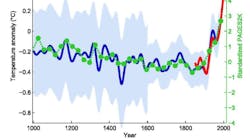For most of us, climate change is now founded science. And the warming ocean temperatures and sea level rise, resulting from that climate change, are everyday realities… particularly for those of us who live in coastal South Florida, like me.
Now, scientists are looking at another possible ocean-affecting consequence of climate change: that the AMOC may be slowing down. And if true, that would be, well, bad.
According to the National Ocean Service, part of NOAA, the Atlantic Meridional Overturning Circulation (AMOC) is a system of ocean currents that circulates water from north to south and back in a long cycle within the Atlantic Ocean. This circulation brings warmth to various parts of the globe and also carries nutrients necessary to sustain ocean life.
- To download the new eBook, Ten Years of Clark's Remarks, click here.
The circulation process begins as warm water near the surface moves toward the poles (such as the Gulf Stream in the North Atlantic), where it cools and forms sea ice. As this ice forms, salt is left behind in the ocean water. Due to the large amount of salt in the water, it becomes denser, sinks down, and is carried southwards in the depths below. Eventually, the water gets pulled back up towards the surface and warms up in a process called upwelling, completing the cycle.
Some of you may remember the 2004 disaster movie The Day After Tomorrow starring Dennis Quaid and Jake Gyllenhaal. That film depicted a climate catastrophe – a new ice-age, with the Northern Hemisphere becoming all but uninhabitable – caused by the disruption of the AMOC. Now, in an unsettling fiction-turned-reality scenario, scientists are actually considering the potential consequences of the AMOC actually slowing down.
What would that mean?
Well, think of the AMOC as a conveyor belt that moves warm water from the tropics to the North Atlantic, with the heat affecting the Atlantic climate. According to Scientific American magazine, multiple studies have found that the AMOC is, indeed, slowing, and that anthropogenic climate change may be at least partially to blame. Some scientists believe that if it slows enough, it will totally collapse, and that it has happened before.
Ancient climate studies suggest that the AMOC collapsed some 13,000 years ago, causing large amounts of melting ice to pour into a warm ocean.
The big question is, obviously, when could that happen? In its most recent report, the UN Intergovernmental Panel on Climate Change (IPCC) indicated that there was “medium confidence” that the AMOC would not collapse before the end of this century. Unfortunately, some scientists think that model may be optimistic, and that an abrupt change in the AMOC could occur sooner.
Today, as scientists study this phenomenon nearly 20 years after the release of The Day After Tomorrow, I can't help but think of this quote from author Tom Clancy: “The difference between fiction and reality? Fiction has to make sense.”
###########
A contributor to HPAC Engineering since 2013 and a member of its editorial advisory board, the author is a principal at Sustainable Performance Solutions LLC, a south Florida-based engineering firm focusing on energy and sustainability. He can be reached at [email protected].









